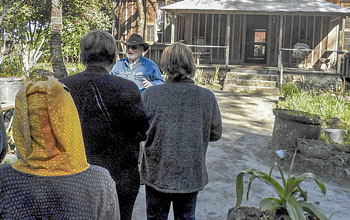NEWBERRY – On Feb. 29, 2020 a small group of visitors, who braved the chilly and windy morning weather, was treated to a walk through time covering over 160 years. They had come to Dudley Farm Historic State park for a tour of the homestead and surrounding buildings built by the Dudley Family over three generations. Park volunteer Doug Day led the hour-long tour, explaining the family history and the agricultural techniques used over the generations to make the farm an important crossroads in early Florida history.
Listed on the National Register of Historic Places, Dudley State Park is a one-of-a-kind, authentic working Florida farm rather than a re-created farmstead. Staff and volunteers in period clothing perform chores, raise crops and tend to livestock—cracker cows and horses, bronze turkeys and heritage breed chickens.
The 327-acre park has 18 original buildings built between the 1880s and 1930s that still existed, including the restored family farmhouse with original furnishings, kitchen, general store, post office and cane syrup complex. Some of the buildings were not part of the original farm but were relocated in the park to give a more complete picture of what life was like in the late 1800s and early 1900s.
After Florida became a state in 1845, settlers from South Carolina arrived seeking land for cotton production. Philip Benjamin Harvey Dudley and his wife, Mary, were part of that migration, settling in Archer in 1852 and purchasing the land that became Dudley Farm in 1859. Dudley rapidly became a middle-class, agrarian through his ownership of 960 acres with 30 slaves who cleared land and grew cotton. But, he and his family also worked hard to make the farm a success, working dawn to dusk. In a time where everyone worked for a common goal, each of his children had duties depending on their age. The original homesite was a log cabin northwest of the present farmhouse. No remains of the original cabin still exist except for the possible location of a well.
Dudley Sr. served the Confederacy during the Civil War as a captain of the Alachua Rangers 7th Regiment. After the war, he returned home to the challenge of managing a large cotton plantation without enslaved workers. Dudley Sr. and his oldest son turned to grazing cattle, in addition to raising cotton and crops with hired help. Work also began on a road from the farm to Gainesville so cattlemen could drive herds to market. Another road intersected at the farm that connected Newberry, Archer, Jonesville and Gainesville. The old road is still visible today as the main path to the farmhouse. These roads and cattle production put Dudley Farm on the map as an important crossroads and commercial center.
When his father died in 1881, his eldest son, Ben Dudley Jr., built the present farmhouse to accommodate his family that grew to eight girls and four boys. He also added a general store, kitchen, smokehouse, sweet potato storehouse, dairy and canning house, outhouses, corncrib and barn. All were constructed of heart pine from the property. The prosperous farm produced cotton, corn, rice, millet, rye, oats, sugar cane and sweet potatoes. Milk, butter, eggs, turkeys and sausage were taken to Gainesville to be sold.
In the Reconstruction era, when jobs were scarce and poverty high in the decimated south, the farm laborers and tenant farmers were paid only with a "furnish" partly consisting of pork and sugarcane. But, the farm prospered and after Ben's death in 1918 his widow continued to work the farm along with her three sons.
Over the years, most of the siblings moved away to start their own careers and families. One son, Ralph Dudley, stayed and continued to raise cattle, tobacco and vegetable crops until his death in 1967. The youngest of Ben’s 12 children, Myrtle Dudley, was the last to remain on the farm. She managed a small cattle herd and vegetable and flower gardens. As she became older, Myrtle carried out her mother’s wish to keep the farm intact by donating 24 acres to the park service in 1983.In 1986, the state purchased an additional 232 acres to preserve the rural landscape that was part of the original Dudley land. The farm not only contained the buildings, but a wealth of documents and furnishings from the generations of Dudleys. One of the conditions of giving the state the property was that Myrtle would live on the farm until her death in 1996 at the age of 94.
Today, living history interpreters conduct daily farm work including the care of cattle, poultry, crops and building maintenance. Cane grindings take place in the fall as they did when the Dudleys lived here. The park regularly holds events exhibiting aspects of the agrarian life from early Florida. On March 7, the park will hold an event called “Plowing up the Past” to celebrate the 85th Anniversary of the State Park Services founding with demonstrations of how Florida farmers prepared for plantings. The following Saturday, March 14, will host kids day with activities for children to learn the history as well as a picnic on the property.
The park is located at 18730 West Newberry Road east of Newberry Florida and is open 9 a.m. to 5 p.m. Wednesday – Sunday. There is a $5 admission per vehicle. For more information, call 352-472-1142.
# # #
Email rcarson@
alachuatoday.com
A Walk though Time, Dudley Farm Historic State Park
Tools
Typography
- Font Size
- Default
- Reading Mode


